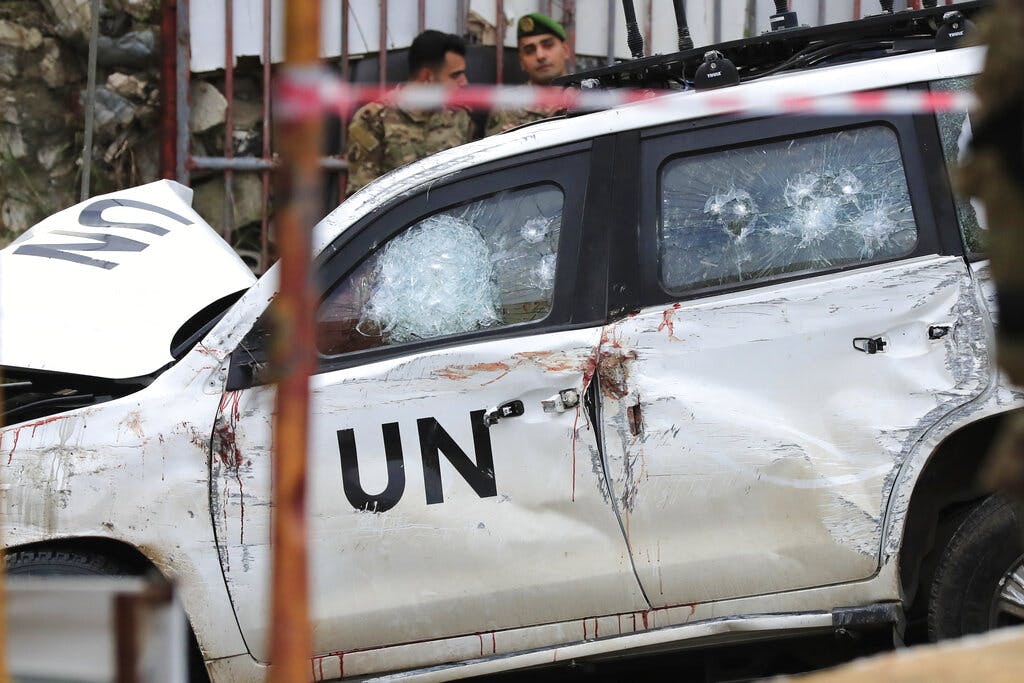Irish Peacekeeper’s Death Underscores Hezbollah’s Sinister Reach
The Tehran-backed terror group is increasingly spreading its wings beyond the Israeli-Lebanese border.

An Irish soldier is the latest victim of the chaos in the Hezbollah-dominated country of Lebanon. Private Seán Rooney’s death Wednesday night underlines the growing danger the Iranian-backed terror group poses to the region and beyond.
The 23-year-old Rooney, of Ireland’s County Donegal, was shot to the head as he traveled in a convoy of two United Nations-marked vehicles on their way from southern Lebanon to Beirut.
Rooney was part of the United Nations Interim Force in Lebanon, which has been deployed to the south of the country since the end of the 2006 war between Israel and Hezbollah.
A second Irish soldier, identified in press reports as 22-year-old Private Shane Kearney, “remains in critical condition with severe head trauma,” according to UN spokesman Stephane Dujarric. Two additional soldiers have been hospitalized as well.
Mr. Dujarric told the Sun that the UN Secretary General, Antonio Guterres, conveyed his condolences to Rooney’s family and wished speedy recovery to the injured troops. Mr. Guterres “recalls the importance of ensuring their safety and security and Unifil’s freedom of movement,” Mr. Dujarric said.
Yet, Hezbollah increasingly challenges and attempts to restrict Unifil’s travel across the country. Although last night’s deadly event happened just north of the UN force’s direct area of jurisdiction, the Security Council has authorized Unifil to navigate freely everywhere in Lebanon.
On Wednesday night one of the Unifil vehicles “got surrounded by a hostile mob — I think that’s the only way you could describe them — and shots were fired and unfortunately one of our peacekeepers was killed,” the Irish defense minister, Simon Coveney, told reporters.
One of Unifil’s main tasks was to disarm, alongside the Lebanese national army, all militias, including Hezbollah. That mission was unrealistic even as the force was created by the Security Council in 2006: Hezbollah is in full control of the area south of the Litani river, where Unifil patrols, and the UN force is no match for the heavily-armed and well-trained Hezbollah.
On a recent visit to the Israeli side of the Lebanese border this reporter witnessed Hezbollah outposts where armed men roam around freely right next to Unifil camps. In front of one Unifil post, someone erected a large banner depicting the Hezbollah chief, Hassan Nasrallah. Another poster near the UN post depicts Qassam Soleimani.
Soleimani, the late commander of Iran’s Islamic Revolutionary Guards Corps Quds force, was killed near Baghdad, Iraq, in January 2020 by an American drone. He had been charged with exporting the Iranian Islamic tenets abroad, and Hezbollah was the crown jewel in his arsenal. The Tehran regime considered the growth of the Lebanese-based terrorist group as Soleimani’s most important achievement.
Traveling on the way to Beirut Wednesday night, the Unifil convoy was surrounded by a group of locals in the Shiite town of Al-Aqbiya. Far from spontaneous, the attack there seemed to target to kill the Unifil soldiers.
“The only visible bullet impacts on the entire @UNIFIL_ vehicle are on the windows,” the Middle East Institute’s Charles Lester tweeted. “Video footage shows the gunfire was brief, targeted & clearly premeditated,” Mr. Lester added. “Not an accident.”
While Hezbollah officially denied responsibility, some of its supporters seemed to condone it. “If you want to change the rules of the game in the Security Council, you have to put up with the consequences,” a pro-Hezbollah account, @Hizbsoldier, tweeted.
Recently Hezbollah has started demanding that Unifil would coordinate all its movements with the Lebanese army, which is dominated by Hezbollah. Although the Security Council mandated freedom of movement, the new demands have become a source of friction.
“Unifil is increasingly being harassed,” the founder of Alma, a think tank based near Israel’s northern border, Sarit Zehavi, told the Sun. “Hezbollah now sees Unifil as a Zionist organization,” she said, adding that last night’s shooting was part of the growing hostility between the terrorist organization and the UN force.
The Tehran-backed Hezbollah is increasingly spreading its wings beyond the Israeli-Lebanese border. Alma’s latest paper painstakingly documents Tehran’s use of the Iranian Mahan Airlines, which is sanctioned by Washington, to transfer arms to Hezbollah and other global allies.
The IDF constantly attacks arms deliveries to Hezbollah in Lebanon and Syria. Yet, Iranian weapon sales to Syria, Iraq, and Yemen, as well as Lebanon, are increasing. Mahan air is also a major conduit for arms and goods delivered from Iran to Venezuela. The airliner is “likely also involved in transferring weapons and other equipment to Russia” for use in Ukraine, according to the Alma report.
Hezbollah is one of Iran’s ties with Russia, as it assaults an American ally in Europe. The terror group arms and props up the Caracas regime in this hemisphere. While Lebanon is further away, America finances 28 percent of the UN’s peacekeeping costs, of which Unifil’s $510 million annual budget is one of the most expensive items.
The killing of an Irish Unifil soldier at the hand of Hezbollah, or its supporters, should raise alarm bells beyond Dublin. Washington must pay attention too.

